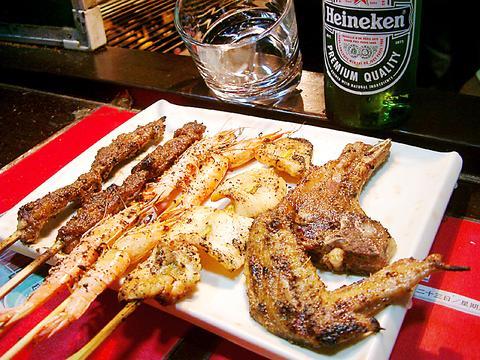For Taipei's office workers, a new place for a quick after-work drink and some tasty late-night snacks is always welcome. The drinks are too expensive in a lounge bar. But if you go to the night market, the food may be good but the environment is not upmarket.
Located on the corner of Renai Road and Guangfu South Road, Jiang-tzi BBQ House is a small cozy stand that is ideal for eating and drinking, as it's cheap and tasty. There are also open-air tables for people-watching.

PHOTO COURTESY OF OWNER
A plate of Xinjiang-style lamb kebab with a bottle of Heineken beer appears to be a strong attraction for Taipei's middle class in the area. Every day, after 4pm, the fragrance of cumin seeds and other spices, as well as the charcoal fire, scent the air.
The place is always full, which is not surprising, given that it has only four tables and a tiny bar area. But the owner, Jack Cheng (鄭
QQ lamb kebab (NT$40), QQ beef (NT$50) and grilled chicken hearts (NT$40) are the three most popular dishes. Jack Cheng is proud of the taste of his BBQ dishes. He said his kebab cooking skills come from two years spent working in China. Originally a trade executive for a computer company, Cheng was fascinated with Xinjiang barbecue and became an apprentice of a BBQ house in Shanghai.
Cheng chooses lamb rib to make the QQ Lamb Kebab while using fillet for another lamb dish -- the House Kebab. "The rib tastes chewy and contains more juice in the meat, while fillet tastes softer and tender but is less juicy," Cheng said.
The 10 kinds of spices and sauces in the marinating process is a secret weapon in Cheng's tasty kebabs. The only thing he is willing to reveal is that "no soy sauce is used in the recipe." After placing the ribs on the BBQ rack, cumin seed powder and chili powder is added.
There are other choices such as lamb chops, beef ribs, grilled chicken wings and shrimp. To cut through the grease in the meats, try the Korean kimchi or Hakka-style onion pickles.
Apart from Heineken beer, there are choices of Smirnoff Ice, small bottles of JP Chenet Cabernet red wine and Macallan 12-year-old whisky, all at reasonable prices.

That US assistance was a model for Taiwan’s spectacular development success was early recognized by policymakers and analysts. In a report to the US Congress for the fiscal year 1962, former President John F. Kennedy noted Taiwan’s “rapid economic growth,” was “producing a substantial net gain in living.” Kennedy had a stake in Taiwan’s achievements and the US’ official development assistance (ODA) in general: In September 1961, his entreaty to make the 1960s a “decade of development,” and an accompanying proposal for dedicated legislation to this end, had been formalized by congressional passage of the Foreign Assistance Act. Two

Despite the intense sunshine, we were hardly breaking a sweat as we cruised along the flat, dedicated bike lane, well protected from the heat by a canopy of trees. The electric assist on the bikes likely made a difference, too. Far removed from the bustle and noise of the Taichung traffic, we admired the serene rural scenery, making our way over rivers, alongside rice paddies and through pear orchards. Our route for the day covered two bike paths that connect in Fengyuan District (豐原) and are best done together. The Hou-Feng Bike Path (后豐鐵馬道) runs southward from Houli District (后里) while the

March 31 to April 6 On May 13, 1950, National Taiwan University Hospital otolaryngologist Su You-peng (蘇友鵬) was summoned to the director’s office. He thought someone had complained about him practicing the violin at night, but when he entered the room, he knew something was terribly wrong. He saw several burly men who appeared to be government secret agents, and three other resident doctors: internist Hsu Chiang (許強), dermatologist Hu Pao-chen (胡寶珍) and ophthalmologist Hu Hsin-lin (胡鑫麟). They were handcuffed, herded onto two jeeps and taken to the Secrecy Bureau (保密局) for questioning. Su was still in his doctor’s robes at

Mirror mirror on the wall, what’s the fairest Disney live-action remake of them all? Wait, mirror. Hold on a second. Maybe choosing from the likes of Alice in Wonderland (2010), Mulan (2020) and The Lion King (2019) isn’t such a good idea. Mirror, on second thought, what’s on Netflix? Even the most devoted fans would have to acknowledge that these have not been the most illustrious illustrations of Disney magic. At their best (Pete’s Dragon? Cinderella?) they breathe life into old classics that could use a little updating. At their worst, well, blue Will Smith. Given the rapacious rate of remakes in modern